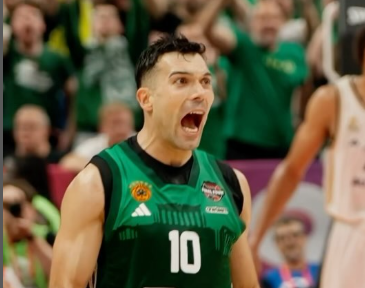Kostas Sloukas, who stands a tall 6′ 3″, has subtly molded one of the most prestigious basketball careers in Europe. His size provides a particularly well-balanced foundation—surprisingly effective for a player who depends on both vision and stability, even though it is not exceptional for the sport. Because of his height, he has been able to maintain remarkable court awareness, turn boldly through defensive traps, and make snap decisions that appear to be instinctive.

Sloukas has forged an exceptional career by using his physique and strategic thinking to win four EuroLeague titles and become just the second player in history to do so with three different clubs. That achievement alone establishes him as a very resilient competitor, especially in light of his 2024 Final Four MVP performance. Sloukas’ leadership skills have significantly improved with age rather than waning, frequently setting the pace with composed yet forceful gameplay. His height, left-handed shooting, and poise all combine to give him a very versatile command on the court.
| Full Name | Konstantinos “Kostas” Sloukas |
|---|---|
| Date of Birth | January 15, 1990 |
| Birthplace | Thessaloniki, Greece |
| Height | 1.90 m (6 ft 3 in) |
| Weight | 90 kg (198 lb) |
| Position | Point Guard / Shooting Guard |
| Current Team | Panathinaikos (Captain) |
| Active Since | 2008 |
| EuroLeague Titles | 4 (2012, 2013, 2017, 2024) |
| Final Four MVP | 2024 |
| National Representation | Greece (Senior Team since 2011) |
| Family | Married to Maria Darsinou; two children |
| Reference |
The signing of Sloukas in 2023 felt like a seismic shift to Panathinaikos supporters. Similar to the 2010 transfer of Vassilis Spanoulis, the contentious move rocked Greek basketball. However, the result was remarkably successful. Sloukas became the team’s symbol rather than merely a member. Before the season started, he was named captain, and he took on the role with poise and a certain composure that only seasoned pros can acquire.
In European basketball, younger, quicker guards have become more popular during the last ten years. However, Sloukas continues to be a mainstay, greatly lowering concerns regarding the longevity of experience in a sport dominated by young people. This durability is significantly influenced by his height. He isn’t too big to give up quick footwork, nor is he overpowered by taller opponents at 6’3″. When combined with his excellent timing and high basketball IQ, that balance makes him a nightmare to guard.
Sloukas was able to quickly fit in with Panathinaikos’ rhythm during the 2024 season. That integration was a cultural triumph rather than merely a military one. The team’s story was changed by his physical presence on the court and his commanding presence in the locker room. His Olympiacos background made some fans wary at first, but they soon warmed to his unwavering commitment and sportsmanship. By all accounts, the player and the club benefited greatly from the move.
The influence of Sloukas goes well beyond the court. His moniker, “Slouky Luke,” which was derived from the well-known comic figure Lucky Luke, is not only endearing but also well-earned. Sportscasters have frequently used the phrase “faster than his shadow” to characterize his keen instincts when describing his shooting and passing. It’s like watching a conductor lead an orchestra when you watch Sloukas in action; every step feels planned, every pause intentional. His use of height to stretch defensive lines, find better angles, and maintain his physical toughness against bigger opponents is the foundation of a lot of that orchestration.
Sloukas has played in eight EuroLeague Finals over the years, winning four titles and making a significant impact on each team he has played for. His physical dependability has been incredibly consistent, which is a quality that is sometimes disregarded in discussions focused on more ostentatious metrics. Sloukas has avoided major injuries through diligent training and astute positioning, demonstrating how the strategic use of height can extend elite-level careers.
Sloukas has acted more and more as a mentor to younger players in recent years, mentoring them both on and off the court. His 6’3″ height has evolved into more than just a measurement; it is now a standard for guards who want to be strong and flexible. Sloukas is actively forming the next generation by coaching players during team practices and national camps. In the eyes of young Greek athletes searching for a real role model, he has literally stood tall.
Through personal involvement in Greek basketball development and strategic partnerships with youth programs, Sloukas has contributed to the development of talent while highlighting the importance of humility and dedication in addition to height. His life story exemplifies a particularly creative strategy for extending one’s career: instead of chasing fame, he has embraced consistency.
His off-court life exhibits the same structure and discipline. Sloukas, who has been married to Maria Darsinou since 2021 and is a father to two children, values family time over attention from others. In his hometown of Thessaloniki, he spends his off-seasons speaking at clinics and advocating for grassroots basketball. His identity is still rooted in that connection to his roots, which gives his public persona more authenticity.
Kostas Sloukas demonstrates that mastery is in control in the context of contemporary European basketball, where flair and speed frequently make headlines. Because of his height, which is frequently cited as being perfect for his role, he has been able to dictate tempo, extend plays, and foster trust among teammates. He stands out not because he is taller but rather because he makes exceptional use of every inch by turning that physical characteristic into a foundation for impact.
Sloukas continues to write his narrative. With Panathinaikos seeing a comeback under his direction and another Greek Championship added to his impressive resume, the discussion surrounding height and basketball utility has a new focal point. His career challenges us to rethink greatness in terms of endurance, adaptability, and purposeful leadership, rather than just raw numbers or explosive athleticism.
